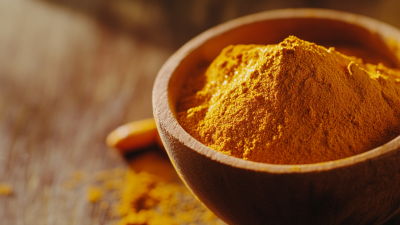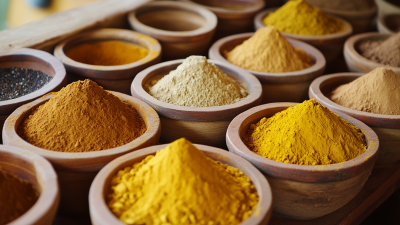50% Response rate
Unlocking the Power of Herbal Powder for Enhanced Wellness Benefits
In recent years, the health and wellness industry has witnessed a remarkable shift towards natural remedies, with herbal powders emerging as a powerful tool for enhancing overall well-being. According to a report from Grand View Research, the global herbal supplement market is projected to reach USD 8 billion by 2025, highlighting a growing consumer preference for plant-based health solutions. Herbal powders, derived from various plants and botanicals, offer a concentrated source of nutrients and medicinal properties that can support immune function, improve digestion, and boost energy levels. As individuals increasingly seek alternative approaches to health management, understanding how to unlock the benefits of herbal powders is essential for those looking to improve their wellness regime naturally.

This guide aims to explore the myriad advantages of incorporating herbal powders into daily life, backed by scientific research and expert insights.
Understanding the Nutritional Composition of Herbal Powders for Wellness
Herbal powders have become a popular choice for those seeking to enhance their wellness routine, primarily due to their impressive nutritional composition. These powders, made from various parts of medicinal plants, pack a concentrated dose of vitamins, minerals, and antioxidants that contribute significantly to overall health. For instance,
moringa powder
is well-regarded for its high content of vitamin C, calcium, and potassium, making it an excellent supplement for immune support and bone health.
Another noteworthy herbal powder is
ashwagandha,
known for its adaptogenic properties. It helps the body adapt to stress while providing a plethora of nutrients including iron, fatty acids, and amino acids.
The blend of nutrients found in herbal powders not only aids in physical wellness but also supports mental health and relaxation. By incorporating these herbal powders into smoothies, teas, or even baked goods, individuals can easily tap into their potent health benefits, paving the way for a more vibrant and balanced lifestyle.
Exploring Different Types of Herbal Powders and Their Unique Benefits
Herbal powders have gained significant attention in recent years, largely due to their numerous health benefits and versatility in use. According to a report by Grand View Research, the global herbal supplements market is expected to reach $285.6 billion by 2027, driven by the rising consumer preference for natural remedies.
Different herbal powders, such as turmeric, ashwagandha, and spirulina, each offer distinct advantages that can enhance overall wellness. For instance, turmeric powder is celebrated for its potent anti-inflammatory properties, thanks to its active compound curcumin, which research suggests may help reduce chronic inflammation and improve joint health.
In addition to turmeric, ashwagandha powder has emerged as a powerful adaptogen, recognized for its ability to alleviate stress and support mental clarity. A clinical study published in the Journal of Clinical Psychiatry found that ashwagandha can significantly reduce stress-related symptoms, thereby fostering emotional stability.
Similarly, spirulina, often touted as a superfood, is rich in antioxidants and protein, contributing to immune support and energy levels. The NutraWords market analysis estimates that the growing trend of health-conscious consumers has led to a 20% increase in the demand for such herbal powders, highlighting their role in modern wellness routines.
As awareness of these unique benefits spreads, herbal powders continue to be integrated into daily health regimens, providing a natural approach to enhancing wellbeing.
Incorporating Herbal Powders into Your Daily Diet for Maximum Impact
Incorporating herbal powders into your daily diet can significantly enhance your well-being. According to a recent report by the Global Herbal Medicine Market, the herbal supplement industry is expected to reach $500 billion by 2025, driven by the rising consumer demand for natural health solutions. Herbal powders, such as moringa, turmeric, and matcha, offer concentrated forms of nutrients and bioactive compounds that can support overall health. For instance, research published in the Journal of Nutrition highlights that turmeric contains curcumin, which can help reduce inflammation and improve joint health, making it a valuable addition to your daily meals.
To maximize the benefits of herbal powders, consider integrating them into smoothies, teas, or sprinkled over meals. A study published in the Journal of Dietary Supplements indicates that combining various herbal powders can create synergistic effects, enhancing their overall efficacy. For example, combining moringa powder, rich in vitamins A and C, with the antioxidant properties of matcha can provide a powerful energy boost and support immune function. As the trend towards holistic health continues to grow, incorporating these herbal powders into your diet could be the key to unlocking a healthier lifestyle.
Unlocking the Power of Herbal Powder for Enhanced Wellness Benefits
| Herbal Powder | Main Benefits | Recommended Dosage | Incorporation Tips |
|---|---|---|---|
| Ashwagandha | Reduces stress, enhances stamina | 1-2 tsp daily | Mix with warm milk or smoothies |
| Turmeric | Anti-inflammatory, boosts immunity | 1 tsp daily | Add to curries, rice, or teas |
| Spirulina | High in protein, supports detox | 1-3 g daily | Blend into smoothies or juices |
| Maca Root | Enhances energy, hormone balance | 1-3 tsp daily | Mix with oatmeal or yogurt |
| Ginger Powder | Aids digestion, relieves nausea | 1-2 tsp daily | Use in teas or baked goods |
DIY Recipes: Creative Ways to Use Herbal Powders for Health Boosts
 Herbal powders have been celebrated for their numerous health benefits, and incorporating them into your daily routine can be both fun and beneficial. There are numerous creative ways to use these powders to enhance wellness. One easy method is to add herbal powders like spirulina or matcha to your morning smoothie. This not only boosts the nutritional profile but also provides a vibrant color and unique flavor. Try blending a banana, a handful of spinach, and a tablespoon of matcha for a refreshing energy drink that kick-starts your day.
Herbal powders have been celebrated for their numerous health benefits, and incorporating them into your daily routine can be both fun and beneficial. There are numerous creative ways to use these powders to enhance wellness. One easy method is to add herbal powders like spirulina or matcha to your morning smoothie. This not only boosts the nutritional profile but also provides a vibrant color and unique flavor. Try blending a banana, a handful of spinach, and a tablespoon of matcha for a refreshing energy drink that kick-starts your day.
Another exciting way to utilize herbal powders is through homemade energy bites. Combine your choice of nut butter with rolled oats, honey, and a tablespoon of cacao or maca powder for a delicious treat. These bites can serve as a perfect pre-workout snack or an afternoon pick-me-up. Experimenting with different combinations allows you to discover new flavors and health benefits. You can also sprinkle herbal powders on salads, yogurt, or incorporate them into baked goods for an extra wellness boost without compromising taste. Enjoy the journey of exploring herbal powders in your kitchen!
Research and Evidence: The Science Behind Herbal Powders and Wellness
Herbal powders have long been recognized for their potential wellness benefits, supported by a growing body of scientific research. For instance, saffron, revered as a traditional remedy, has gained attention for its ability to alleviate PMS symptoms and even aid in weight loss. Studies indicate that the active compounds in saffron can modulate mood and reduce stress, which is crucial in today's fast-paced world where managing cortisol levels is vital for overall health. A diet incorporating such anti-inflammatory herbs may not only enhance mood but also support a balanced hormonal response.
Similarly, fenugreek seeds have been highlighted in recent reviews for their role in disease prevention and overall health enhancement. Rich in nutrients, fenugreek can contribute significantly to improving cardiovascular health and managing blood sugar levels. Research underscores that incorporating these herbal powders into daily nutrition can yield substantial health benefits, making them an essential component of modern wellness practices. Furthermore, studies on holy basil (Tulsi) reveal its promising effects in reducing LDL cholesterol and inflammation, emphasizing the connection between herbal compounds and optimal health outcomes.

Related Posts
-

Exploring the Best Herbal Products from Leading Manufacturers at the 137th Canton Fair
-

How to Source the Best Turmeric Extract for Your Business Needs
-

Choosing Quality Herb Powder Manufacturers for Global Sourcing Success
-

7 Best Benefits of Curcumin Extract Powder for Health and Wellness
-

Unlocking the Potential: A Comprehensive Guide to Sourcing Herbal Extracts for Your Business
-

Understanding the Differences in Boswellia Extracts for Your Health Needs